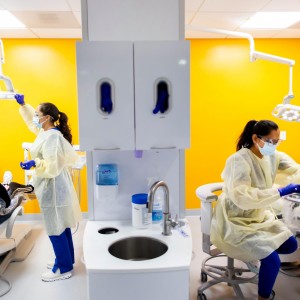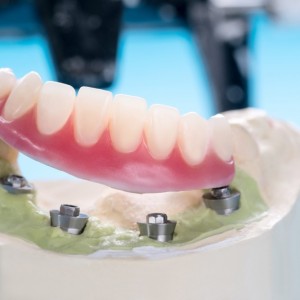
Penn Dental Medicine Study Shows Saliva Test May Help Mark Gum Disease Progression
Measuring levels of key proteins in patients’ saliva may be a relatively easy way for dentists—and even patients themselves—to track the progression of gum disease (periodontitis), suggests a new study led by Penn Dental Medicine researchers.
In the study, the researchers monitored and tested saliva samples from more than 400 patients for up to a year and a half. They found that, on average, patients with moderate to severe progression of periodontitis showed substantial increases in nine inflammation-related signaling proteins in saliva.
The study appears in the December Journal of Clinical Periodontology, a 50th-anniversary edition that showcases particularly high-quality research.
“One can imagine a saliva test kit, based on such findings, that dentists could use—and even periodontitis patients could use at home. It could be a very useful personalized-dentistry tool for assessing risk and tailoring care,” says study lead author Flavia Teles, DDS, MS, DMSc, associate professor in the department of basic & translational sciences at Penn Dental Medicine.
Between 20% and 50% of the global population has some level of periodontitis, including about 64 million people in the U.S. If untreated, this chronic bacterial infection and inflammation of the gums often lead to the loss of the bone that anchors teeth, which can cause tooth loss.
This study enrolled 302 individuals with early to moderate/severe periodontitis and 113 individuals without periodontitis. Subjects’ periodontitis status and progression were assessed every two months for a year. They also had saliva and blood samples taken. The saliva samples were tested for 10 inflammation-linked proteins, and the blood samples for five. After a year, researchers gave periodontitis subjects standard non-surgical periodontal therapy and checked them again three and six months later.
The results showed that periodontitis patients who had the most disease progression during the year had significantly higher levels of several inflammation-related signaling proteins in their saliva. These included interferon-gamma, IL-6, VEGF, IL-1β, and MMP-8. Following treatment, these levels subsided.
The levels of such proteins in subjects’ blood did not differ significantly by the degree of disease progression, although MMP-8, MMP-9, and C-reactive protein did fall significantly following treatment.
The findings suggest that changes in levels of inflammation-related proteins in saliva over time can help assess the risk of periodontitis progression as well as treatment effectiveness—and that blood levels also may be helpful in the latter case.
Source: https://www.dental.upenn.edu/
 Related articles
Related articles
Editorials 14 November 2025
Penn Dental Medicine shared its expertise in caring for persons with disabilities with dental care providers from throughout Jamaica at a 1 ½ -day hands-on continuing education program, held October...
Penn Dental Medicine at PHMC on Cedar is one of five community care programs the School of Dental Medicine operates. At Penn Dental on Cedar, part of the mission is to integrate dental and medical...
Editorials 23 July 2025
The Center for Innovation & Precision Dentistry (CiPD) at Penn Dental Medicine proudly hosted its Fourth Annual CiPD Symposium on May 29 bringing together a dynamic community of dentists,...
Oral healthcare providers and patients will soon receive more frequent, evidence-informed recommendations to advance oral and overall health with the establishment of the ADA Living Guideline...
Editorials 26 May 2025
Groundbreaking program to provide evidence-informed guidelines in real time to support patient care and advance public health
 Read more
Read more
Prosthodontics 17 November 2025
The purpose of this report is to describe a new technique to fabricate and deliver an implant-supported fixed prosthesis to the patient on the day of surgery, and to propose a protocol for the...
Editorials 17 November 2025
The Langkamp Allison Award recognizes a Pitt Dental Medicine third-year dental student interested in pursuing a career in dental education.
Products 17 November 2025
VELMENI today unveiled VELMENI Voice, an AI-driven voice recognition tool designed to transform periodontal charting and clinical documentation.
News 17 November 2025
Angelalign Technology Inc. (6699.HK) (“Angel”) recently announced the expansion of its flexible iOrtho platform to include direct integration with the Dexis, Shining 3D, and Panda scanners.
News 17 November 2025
Following the first FDA clearance for technology that measures internal mobility in teeth, Perimetrics CEO and Chairman Robert Hayman is once again leading dentistry into a new era with InnerView, a...














